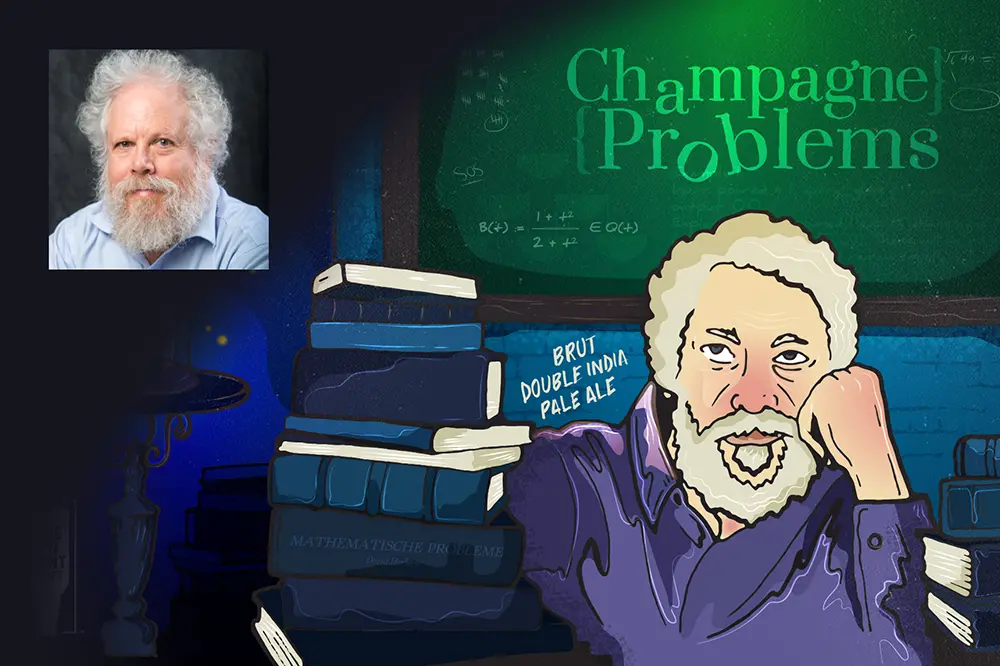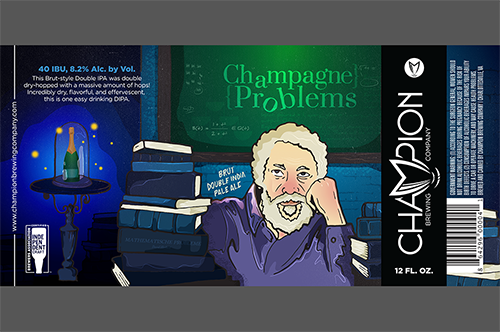

Mathematics professor Bruce Reznick doesn’t drink much beer, though he does have a certain joke about it he likes to tell.
“Every time you see me not drinking a can of beer, the beer I'm not drinking is Champagne Problems,” Reznick likes to say.
That’s because Reznick, who has been at the University of Illinois since 1979, was the inspiration for the label of Champagne Problems, a brut-style double IPA beer that Champion Brewing Company, based in Charlottesville, Virginia, launched in June.
Champion crafted the beer’s label with Reznick’s likeness front and center, showing him deep in thought, while the so-called Champagne Problem, a famous mathematical formula that he was able to create a partial solution for, is depicted on the chalkboard behind him. It looks like this:

Bear with us for a couple of paragraphs: The story of how that translated into Reznick’s likeness on a beer can requires some numbers. In the mid-1990s, Reznick was able to prove a partial solution to German mathematician Eberhard Becker’s Champagne Problem, which had given some of math’s brightest minds fits for years.
Becker proved that for every even integer m, B(t) can be written as a sum of the m-th powers of rational functions with rational coefficients. The Champagne Problem was set up to allow for an actual construction of these rational functions, like the one above.

Reznick’s contribution was to give a specific example for m = 4, and specific examples of rational functions for m = 6 or larger, though in these cases, the rational functions had real, not rational, coefficients.
“(Becker) proved abstractly that there have to exist a certain class of formulas,” Reznick said. “The Champagne Problem was to give an actual construction of the formulas. Not just to prove they exist, but actually to be able to write them down. I made a partial result on that. I got an exact example of the smallest case, which is in degree four.”
Becker’s problem gained fame in the mathematical world in part because he promised a case of champagne to the first person to solve it. While no one has solved the problem in the exact form in which Becker proposed it, Reznick’s partial solution generated some waves in the academic community--and, while he didn't get a case of champagne, he did get a bottle.
“It was a kind of formula that people didn't know existed, and then it existed,” Reznick said. “That’s what I was able to do.”
Coincidentally, Champion Brewing Company was brainstorming ideas for a brut-style IPA because it was growing in popularity as a beer, according to operations manager Jonny Nuckols. When Nuckols, who holds a graduate degree in mathematics from The College of William and Mary, learned that Champion was moving forward with its own brut-style India pale ale and wanted to go with the name Champagne Problems, he thought of Becker’s problem.
Champion was originally planning to call the beer Champagne Problems as a way to poke fun at the idea of people spending their time on abstract problems. Nuckols, however, figured it would be more fitting to model the beer around the actual math problem.
With a little bit of internet research, he learned of Reznick and how he cracked the problem, and knew that the professor would be a perfect fit for the label.
“I actually didn't know a whole lot about the problem itself,” Nuckols said. “I knew of it, but I didn't know Professor Reznick, I didn't know much about it. I just knew, sort of, the history. I pitched it and they said, ‘That's kind of great.' It somewhat fit the original idea of the Champagne Problems being like mathematicians trying to solve these really esoteric, abstract questions.”
For Reznick, the whole thing seems surreal. Even after roughly 40 years at Illinois, he is bewildered by the butterfly effect that academic work and discoveries can have.
“This is probably the strangest thing that's happened to me as a professor,” Reznick said. “It's just the freakishness of it, it's completely unexpected. To some extent, if you hang around long enough, these things start to happen to you.”
Reznick recently tried the beer for the first time, and was taken aback by how strong it was. It is 8.2 percent alcohol.
Nuckols agreed that it’s funny how things all turned out, with a brewing company from Charlottesville, Virginia, drawing its inspiration for a beer called Champagne Problems from a mathematics professor living in Champaign, Illinois.
“As far as the surreal nature of it, I think it would probably be a surprise to just about anybody,” Nuckols said. “To think that a brewery in Virginia would reach out to a mathematician in Illinois is just so strange. I think he really appreciated that aspect of it. It got kind of even more strange by the fact that he is working at the University of Illinois at Urbana-Champaign.”